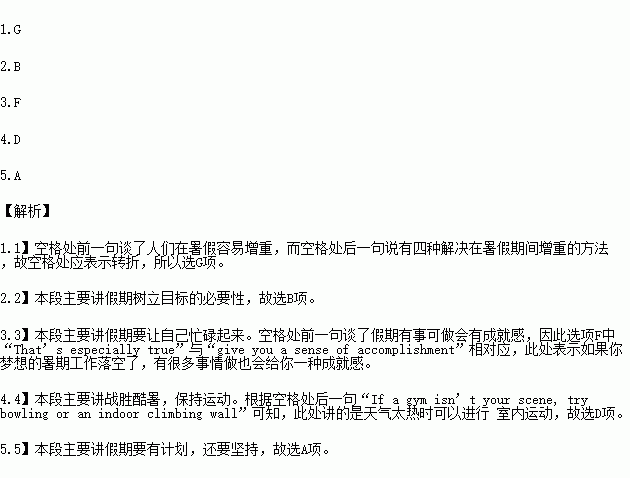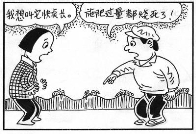题目内容
Four Ways to Beat Summer Weight Gain
When we think of summer, most of us think of outdoor fun. So it seems like we should naturally lose weight over the summer. In reality, summer isn’t all beach volleyball and water sports. Therefore, we can gain weight easily in the summer. 1. Here are four ways to beat summer weight gain.
1.2. When we don’t have a plan, it’s easy to spend summer moving from the couch to the computer, with regular stops at the fridge. Avoid this by aiming for a specific goal, like volunteering or mastering a new skill. Just be sure to plan for some downtime so you can relax a little!
2. Stay busy. When we’re bored, it’s easy to fall into a trap of doing nothing and then feeling low on energy. In addition to helping you avoid the cookie jar, getting loads of stuff to do can give you a sense of accomplishment.3..
3. Beat the heat. Don’t let summer heat put your exercise plans on hold4.if a gym isn’t your scene, try howling or an indoor climbing wall. If you love being outdoors, try swimming or a regular run in the early morning or evening.
4. 5.with school out, we lose our daily routines. If you don’t have a specific job or an activity to get up for, it’s easy to sleep late, watch too much TV, and snack more than usual. Make sure your summer days have some structure – like getting up at the same time each day. Plan activities for specific times, like exercising before breakfast.
A. Stick to a schedule.
B. Get going with goals.
C. Relax by walking outside.
D. Move your workout indoors.
E. We usually stay at home in summer.
F. That’s especially true if a dream summer job falls through.
G. However, it’s easy to avoid this problem if we know what to look out for.
 新思维寒假作业系列答案
新思维寒假作业系列答案


 建议并说明理由。
建议并说明理由。